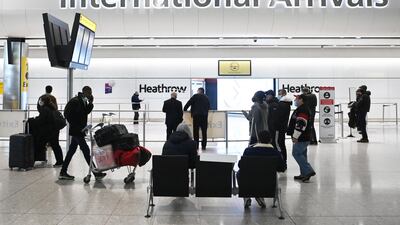Heathrow has plunged to a £2 billion ($2.8bn) loss in 2020 after a brutal year that saw a pandemic-induced drop in passenger numbers of 73 per cent.
The airport hopes a combination of tax breaks and digital health checks can help the airport dig its way out of the hole.
Heathrow's chief executive John Holland-Kaye said digital technology and international travel agreements would be vital to reviving the travel industry.
Passenger numbers fell 73 per cent to 22 million people last year, with half of those travelling during January and February, before the pandemic shut down the bulk of global travel in March.
Heathrow said that despite the £2 billion loss before tax for 2020 it has £3.9 billion of liquidity, giving it sufficient resources to keep going with low levels of traffic until 2023.
The airport is forecasting 25 million passengers in the second half of the year, meaning it would be operating at about 50 per cent capacity.
Mr Holland-Kaye urged finance minister Rishi Sunak to give airports the same exemption from business rates and property taxes given to other sectors hit hard by the coronavirus pandemic.
"We want a level playing field so we don't have to pay that either," Mr Holland-Kaye told BBC television. "That is just fair."
As Covid restrictions are lifted and the vaccination roll-out gathers pace, long-haul travel to other low-risk nations is likely to recover, Mr Holland-Kaye said.
He cited Australia, New Zealand, Singapore and China as destination examples.
"We will see a patchwork reopening of long-haul markets depending on the progress of vaccinations," he added.
Digital health checks that mean people move through the airport quicker will be key to its revival.
At present, paper checks on Covid-19 test results and passenger locator forms take 20 minutes per traveller at Heathrow, and that queue of stalled people makes it hard to increase passenger numbers from current low levels.
"It's absolutely critical and that's one of the main things that government needs to work on," he said, when asked about a digital health app.
It was "very likely" people would be able to go on their summer holidays, Mr Holland-Kaye predicted.
Heathrow last year lost its title as Europe's busiest airport to Paris after its flight schedules shrank sharply.









